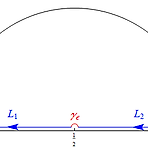 오늘의 계산 57 - Calculation Suite
오늘의 계산 57 - Calculation Suite
그동안 여기저기 싸지른 잡다한 계산들을 한 번 정리해볼까 합니다. Problem #. Show that \begin{equation*} \int_{0}^{\frac{\pi}{2}} \log \left(x^{2} + \log^{2}(\cos x) \right) \, \mathrm{d}x = \pi \log \log 2. \tag{1} \end{equation*} This problem is from [IS1]. Solution. Let $I$ denote the integral in $\text{(1)}$. By recalling the identity \begin{align*} x^{2} + \log^{2} (\cos x) = \left| \log \left( \frac{1+e^{2ix}}{2} \rig..
Here I am going to introduce some easy results on some criteria for interchanging the order of integration which are not covered by the classical Fubini theorem. Though both statements and proofs are weak and easy, it often reduces our burden to large extent. Let $f$ be a locally integrable function on $(0, \infty)$. That is, $f$ is a measurable function which is integrable on any compact subset..
- Total
- Today
- Yesterday
- 미쿠
- 오일러 적분
- Gamma Function
- 린
- 푸리에 변환
- 편미방
- 노트
- 대수기하
- 수학
- Fourier Transform
- 무한급수
- 렌
- 적분
- binomial coefficient
- 보컬로이드
- Integral
- Beta function
- Zeta function
- infinite summation
- 제타함수
- 계산
- Euler integral
- 이항계수
- 해석학
- 감마함수
- 유머
- Euler constant
- 오일러 상수
- Coxeter
- 루카
| 일 | 월 | 화 | 수 | 목 | 금 | 토 |
|---|---|---|---|---|---|---|
| 1 | 2 | 3 | 4 | 5 | ||
| 6 | 7 | 8 | 9 | 10 | 11 | 12 |
| 13 | 14 | 15 | 16 | 17 | 18 | 19 |
| 20 | 21 | 22 | 23 | 24 | 25 | 26 |
| 27 | 28 | 29 | 30 | 31 |

